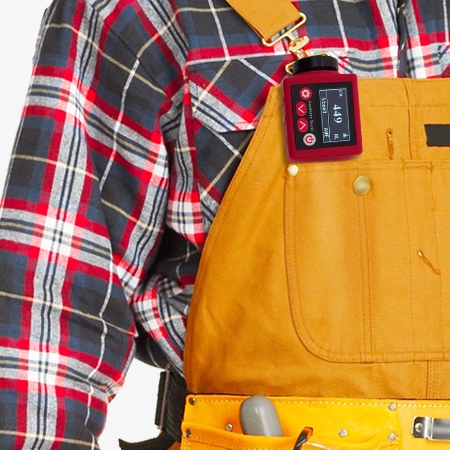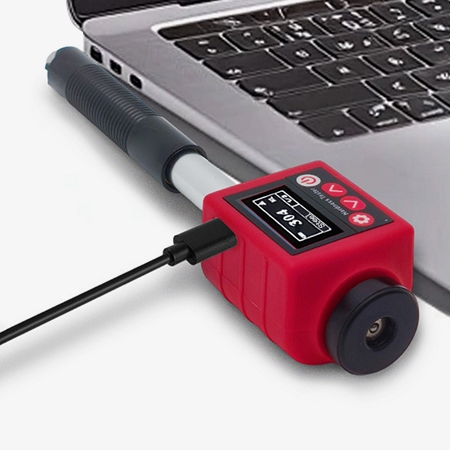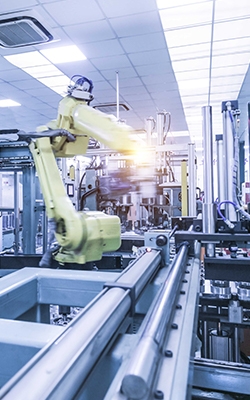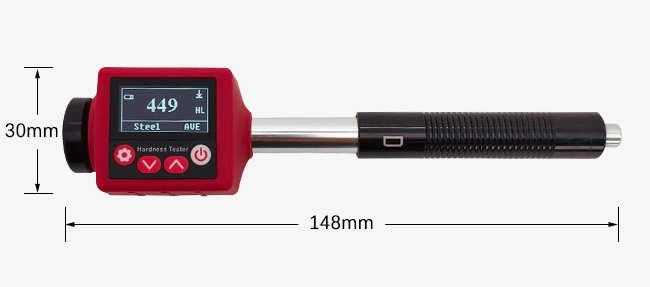SISCO Leeb pen type hardness tester is a compact, portable device used to measure the hardness of metals based on the Leeb rebound method. This type of tester is shaped like a pen, making it lightweight, easy to handle, and ideal for on-site inspections.

Pen-type Leeb Hardness Tester, Small and Compact
- Enhanced Portability. The compact size allows technicians to carry the Leeb tester effortlessly, even in a pocket or tool bag. This mobility makes it ideal for on-site testing. It eliminates the need for bulky equipment and enables rapid deployment.
- Cost-Effective Solution. It has a low cost and is suitable for small and medium-sized enterprises or individuals to use. The manufacturing cost is relatively low. Pen-type Leeb hardness tester does not rely on large peripherals or brackets, saves on accessory expenses, and reduces maintenance difficulty and costs.

Supports USB Charging
- Longer Battery Life. Many USB-chargeable models are designed with lithium-ion batteries, which offer longer life cycles compared to traditional AA or AAA battery-powered devices. This means less downtime between tests and more efficient operations, especially in environments that demand frequent and continuous testing.
- Universal Compatibility. USB ports are universally available and widely used across various devices and industries. This universality ensures that users can easily find compatible charging sources regardless of their location, increasing the reliability of Leeb digital hardness tester in different work environments.
Applications
Leeb hardness testers are widely used for on-site hardness testing of large and heavy metal parts. Their primary application is in quality control and maintenance across various industries, including manufacturing, automotive, shipbuilding, and power generation. They are especially useful for testing hard-to-move components like large castings, forgings, shafts, pressure vessels, and welded structures.

Shipbuilding Industry

Manufacturing Industry

Metal Processing

Automotive Industry
| Model | SISCO-HT-XH960 |
| Measurement Direction | Support 360° (vertical downward, diagonal downward, horizontal, diagonal upward, vertical upward) |
| Scope of Testing | (170-960)HLD, (17.9-69.5)HRC, (19-683)HB, (80-1042)HV, (30.6-102.6)HS, (59.1-88)HRA, (13.5-101.7)HRB |
| Hardness Scale | Reinhard (HL), Brinell (HB), Rockwell B (HRB), Rockwell C (HRC), Rockwell A (HRA), Vickers (HV), Shore (HS) |
| Indicating Error | ±0.5% (HLD=800) |
| Indication Repeatability | 0.8% (HLD=800) |
| Display | 128×64 OLED display |
| Power Supply | Rechargeable lithium battery |
| Working Hours | About 20 hours |
| Operating Temperature | -10 ℃~50 ℃ |
| Storage Temperature | -30 ℃~60 ℃ |
| Humidity | ≤90% |
| Dimension | 148*30*30mm |
| Weight | About 4.05kg (total box weight) |
Dimension:

Q1: What is Leeb hardness tester?
A1: A Leeb hardness tester is a portable device used to measure the hardness of metals and alloys by the Leeb rebound principle. It operates by releasing a standardized impact body against the test surface and measuring the rebound velocity.
Q2: What does the Leeb hardness value (HL) represent?
A2: The Leeb hardness value (HL) represents a measure of a material's surface hardness based on the rebound principle. It is determined by the Leeb hardness test, where a small, hard impact body is propelled against the test material’s surface. The device measures the velocity of the impact body both before and after striking the surface. The Leeb hardness value is calculated from the ratio of the rebound velocity to the impact velocity, multiplied by 1000, and is expressed in HL (Hardness Leeb) units.
Q3: What materials can be tested using a Leeb hardness tester?
A3: A Leeb hardness meter is primarily used to measure the hardness of metallic materials. It is suitable for testing metals such as steel, cast iron, cast steel, stainless steel, and various alloys.
Tips: What are the advantages of using pen-type Leeb hardness tester?
A pen-type Leeb digital hardness tester offers several advantages. Its compact and portable design allows for easy on-site testing, especially in tight or hard-to-reach areas. It provides quick and non-destructive measurements. The device is user-friendly, with simple operation and digital readouts for instant results. Additionally, its rechargeable battery and durable construction enhance reliability.
Thank you for buying industrial test and measurement equipment on SISCO.com, all products sold by SISCO and the partner cover a 12 months warranty, effective from the date of receiving the products.
What is covered?
SISCO is responsible for providing free spare parts, and free technical support to assist the customer to repair the defective products until the problem is solved.
What is not covered?
- Product purchased from anyone other than a SISCO store or a SISCO authorized reseller.
- Expendable parts.
- Routine cleaning or normal cosmetic and mechanical wear.
- Damage from misuse, abuse or neglect.
- Damage from use of parts other than SISCO approved.
- Damage from use outside the product’s usage or storage parameters.
- Damage from use of parts not sold by SISCO.
- Damage from modification or incorporation into other products.
- Damage from repair or replacement of warranted parts by a service provider other than a SISCO authorized service provider.
- Damage caused by the application environment not meeting the product usage requirements and the failure to perform preventive maintenance.

